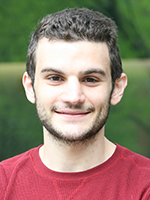MCO students Felix Barber and Gal Lumbroso have been awarded prestigious fellowships that will support their future research. Barber, a joint student in the Amir and Murray labs, is the recipient of the GSAS Merit Fellowship, andl Lumbroso of the Murray Lab has received a Phd Fellowship from the Germany-based public foundation Boehringer Ingelheim Fonds (BIF).

Felix Barber
Barber, who comes from a math background, hopes to use his quantitative skills to shed light on how cells decide how large to grow. “Specifically, I’m trying to understand how cell size regulates the point at which budding yeast cells commit to replicating their DNA and dividing,” he says.
His scientific approach incorporates both mathematical modeling and wet lab experiments with the yeast, and in the coming year, the GSAS Merit Fellowship–an internal Harvard fellowship awarded to outstanding grad students–will support Barber’s continuing work.
“This fellowship will fund me while I do genetic perturbations of the molecular regulation of this decision making process (to divide or not to divide). I think these experiments have the potential to really change how we think about how size influences this decision.”
Barber is happy to receive this fellowship and looking forward to continuing his experiments. He says, “I’d like to thank both of my advisors, Andrew Murray and Ariel Amir, for writing reference letters for this at short notice. I’d also like to thank the William Georgetti Trust who have supported me for the first three years of this PhD.”

Gal Lumbroso
Lumbroso is fascinated by the idea of historical accidents. Specifically, he’s interested in how chance mutations became codified into fundamental biology through evolution and alternate paths evolution could have taken.
His research focuses on meiosis, the process of diploid cells dividing into haploid gametes. Lumbroso is particularly interested genetic recombination, the step of meiosis where pairs of chromosomes line up and exchange genetic material. “Recombination is a process that involves breaking and reorganizing genetic material,” he explains. “In the vast majority of cases, meiosis requires recombination to work. I want to understand how fundamental this requirement is, and what sort of other cellular mechanisms can replace recombination in meiosis.”
After submitting a research proposal, Lumbroso was awarded a fellowship from Boehringer Ingelheim Fonds (BIF), a Germany-based organization that funds basic biomedical research and fosters career development for up-and-coming researchers around the world. “The BIF fellowship will support my training as a scientist and hopefully familiarize me with different aspects of the scientific world, both in academia and out,” Lumbroso says.
Lumbroso is grateful for the encouragement he’s received from the Harvard MCB community. “I’d like to thank my supervisor, Andrew Murray, for his patience and advice during the application process, and everyone in the Murray lab who helped along the way,” he says. “I’d also like to thank Fanuel Muindi for originally suggesting I apply to this fellowship.”
by Diana Crow



